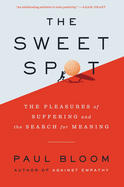
 In The Sweet Spot: The Pleasures of Suffering and the Search for Meaning, Yale University psychology professor Paul Bloom makes a spirited argument for the proposition that instead of being motivated by the simple desire to seek pleasure and avoid pain, "under the right circumstances and in the right doses, physical pain and emotional pain, difficulty and failure and loss, are exactly what we are looking for."
In The Sweet Spot: The Pleasures of Suffering and the Search for Meaning, Yale University psychology professor Paul Bloom makes a spirited argument for the proposition that instead of being motivated by the simple desire to seek pleasure and avoid pain, "under the right circumstances and in the right doses, physical pain and emotional pain, difficulty and failure and loss, are exactly what we are looking for."
Consistent with Bloom's thesis, there's a term--"motivational pluralism"--coined by the economist Tyler Cowen, that describes his perspective on the complex, sometimes conflicting desires that drive human behavior. Among his several goals in the book, he says, is to provide a "broader picture of human nature," one that recognizes that, rather than pure hedonism, "we are inclined toward something deeper and more transcendent."
Bloom is convinced that a well-lived life involves "among other things, moral goodness and meaningful pursuits," and that "some forms of suffering, involving struggle and difficulty, are essential parts of achieving these higher goals, and for living a complete and fulfilling life." When it comes to meaning itself, he's far less interested in an abstract search for the meaning of life than with what it is that gives life meaning. Focusing instead on an attempt to define what he considers "meaningful activities," he argues that "you can achieve a meaningful life without knowing that you're trying to achieve it or thinking about it at all."
As demanded by the ambitious scope of his subject, Bloom, author of Against Empathy: The Case for Rational Compassion, marshals a large body of evidence, including numerous scientific studies. In a given chapter he may rely on material from an experiment in the field of happiness studies by the well-known psychologist Daniel Kahneman alongside an account from a mixed martial arts fighter that illustrates how "the terrible can morph into the transcendent," followed by a summary of an Ursula Le Guin short story about a land whose inhabitants pay a terrible price for their happiness. His resources are both eclectic and intellectually stimulating.
Bloom himself has an impressive range of interests, and he's unafraid to explore discrete questions that surround his central theme. These include quirky ones, like why some people enjoy horror movies or explaining the lure of BDSM, and more profound ones, like what effect having children has on one's sense of life's meaning or whether unchosen suffering makes us more resilient. The Sweet Spot is certain both to spark reflection and not a few vigorous rebuttals. Regardless of where one lands on its central themes, it's consistently provocative, thoughtful and often sheer fun to read. --Harvey Freedenberg, freelance reviewer
Shelf Talker: Psychologist Paul Bloom explores how essential the experience of suffering is in giving meaning to our lives.

